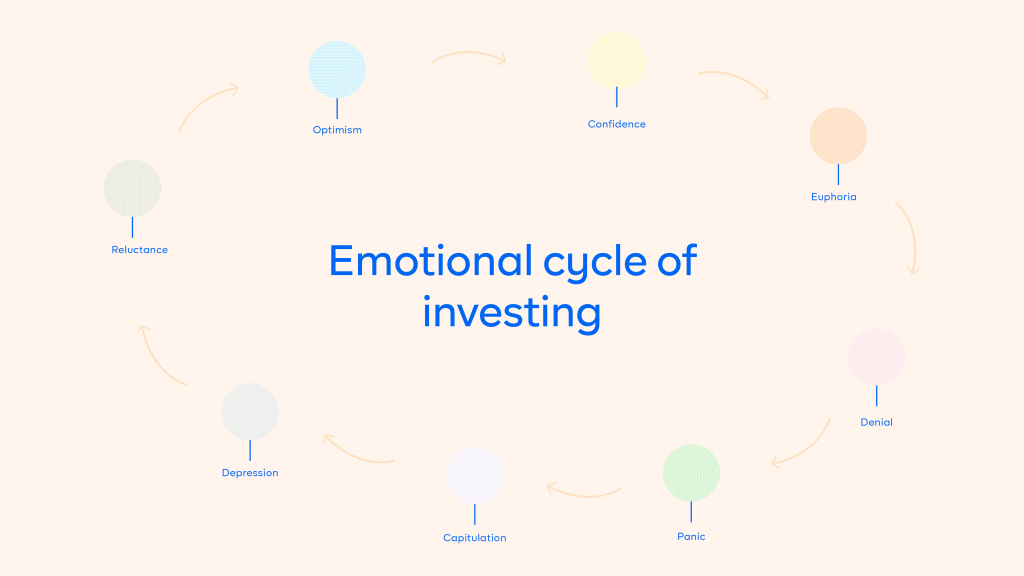
Experts can make weak attempts at predictions but no one can control the market performance. As a result, this feeling of powerlessness often leads investors to make emotion-based investing decisions.
When you start to invest emotionally, you are letting fear or greed get the better part of you. This leads to impulsive decisions that may eventually bring about losses.
Sometimes, the biggest risk is not the market volatility but the investors’ reaction to the fluctuations.
However, understanding when a decision you’re about to make is based on emotion can stop you right in your tracks and help avoid costly mistakes.
This article focuses on emotion-based investing, its causes and how to avoid it.
Key Takeaways:
- Although no one can predict what will happen, there are tips that investors can consider to help manage their reactions during market volatility.
- Take the emotion out of investing to avoid making irrational investing decisions.
- Investing is a long-term goal.
Jump to a section:
- What is emotion-based investing?
- Causes of emotion-based investing
- Tips to avoid emotion-based investing
- Emotional cycle of investing
What is emotion-based investing?
Emotion-based investing is investments done emotionally, as opposed to one based on market data or other fundamentals.
It is based on an investor’s instincts influenced by market fluctuations.
To further break it down, it means making an investment decision based on the instincts and reactions of others.
It’s making decisions out of fear and greed. i.e., buying because you feel it’s good and selling because you think it’s bad.
Causes of emotion-based investing
1. Media hype
The media is one of the major influences on market fluctuations. Good news causes people to buy stocks, the same way negative news causes people to sell their stocks.
If a fragile investor follows the news and sees that the stock market is falling, it can lead them to panic sell.
2. Anxiety
Anxiety is usually common for new investors because they are trying to reap the benefits of their investment as soon as they invest.
When an investor is anxious, they often doubt themselves and take reckless actions that can result in significant market losses.
3. Making investment a short-term goal
Investments are long-term goals, not get-rich-quick schemes.
Expecting profit early makes you tempted to make daredevil decisions when things are going great or going bad.
Instead, take emotions out of investing and focus on the long-term game.
Successful investors buy low and sell high.
Tips to avoid emotion-based investing
1. Prepare for market collapses
Sometimes, you pick the best investments you think and hope they’re favourable in the long run, but you still have to mentally brace yourself for market collapses.
You don’t have to panic sell just because your investment is going in a downward spiral. The best advice, most times, is not to do anything because the market can go up as quickly as it collapses.
2. Avoid frequent portfolio check-ins
Checking your portfolio will give you insights into the stock market performance; still, you might be tempted to check often, which is not good for you.
The more you monitor your portfolio, the more likely you are to panic at every market loss. Check no more than a few times a year.
3. Don’t chase performance
There is always a “hot” new investment every day, making investors want to jump on every investment trend, like buying just because something is performing well or selling because a stock is heading for a loss.
4. Diversify your portfolio
One of the tenets of portfolio diversification is that it helps you not to be fixated on a particular investment.
Owning a variety of asset classes can help you find a strong balance in the market and help you enjoy your experience with investing.
While some investments record losses, others record gains; with this balance, you are not focused on investing out of fear.
5. Don’t be influenced by the media
The media should keep you informed and not afraid.
It would be best to not let social media or other news affect your decision-making.
Market declines will always happen. However, if you are not comfortable with too many depressing headlines, talk to your financial advisor.
Emotional cycle of investing

Optimism
When there is a favourable period in the stock market, people tend to overlook the losses and risks.
Confidence
You are confident because the market is increasing, there’s no negative news, and money is being made.
Euphoria
You’re almost at the top. More people are buying into the particular stock. There are a lot of gains in the asset classes. There are no more buyers, and the market starts to fall.
Denial
You might think this temporary setback will eventually bounce back. Unfortunately, the market continues to fall. Other markets and stocks continue to fall.
Panic
Everyone is panicking and worrying about the asset. Emotional investing kicks in. You decide to impulsively sell the stocks, and this is where the meltdown begins.
Capitulation
Here, your emotions are starting to take over. You are filled with anxiety and regret because your stocks have fallen tremendously, and you decide to sell.
Depression
Depression happens when most people have sold their stocks out of fear and panic. But this time, the market is seeing a positive turn.
Reluctance
The investors in this category are those that have decided not to sell. There is now a return to the market, and there’s profit, but investors are still reluctant because of previous losses.
Optimism
They see that the market is bouncing back and have decided to run back to investing because they feel it is safer to invest now.

Bottom line
Investing is not for the faint at heart. When building wealth, it’s imperative to make logical and rational decisions.
Understanding that market declines are normal will help you avoid emotional investing and set realistic expectations. If you feel your emotion is getting in the way of your investment decision, take a step back and consult with your financial advisor, and they will advise you on the best steps to help you reach your financial goals.
Want to tell us about an emotion-based investment decision you made? Pls, share with us in the comments.
ALSO READ
10 Common Investing Mistakes To Avoid
Fear of investing: Cowrywise report
The Psychology of Greed: Why People Pursue Money at Any Cost
Behavioural Finance in Action: How Emotions Affect Your Investment Decisions
